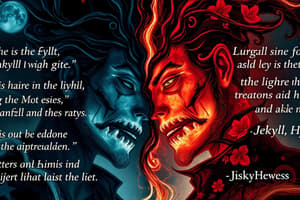Podcast
Questions and Answers
What does Jekyll's dinner party represent?
What does Jekyll's dinner party represent?
- A gathering of professionals
- A social event for the elite
- An opportunity to showcase good wine
- All of the above (correct)
Describe the physical appearance of Jekyll.
Describe the physical appearance of Jekyll.
A large, well-made, smooth-faced man of fifty.
What marks Jekyll's personality?
What marks Jekyll's personality?
Every mark of capacity and kindness.
Jekyll is unashamed of his evil side, Hyde.
Jekyll is unashamed of his evil side, Hyde.
What does Jekyll mean by 'the moment I choose, I can be rid of Mr Hyde'?
What does Jekyll mean by 'the moment I choose, I can be rid of Mr Hyde'?
Hyde is likened to an addiction.
Hyde is likened to an addiction.
What does the phrase 'something of a slyish cast perhaps' suggest about Hyde?
What does the phrase 'something of a slyish cast perhaps' suggest about Hyde?
What does Jekyll imply by saying 'I would trust you before any man alive'?
What does Jekyll imply by saying 'I would trust you before any man alive'?
Study Notes
Jekyll's Dinner Party and Society
- Jekyll hosts a dinner party attended by reputable Victorian gentlemen, demonstrating his high social status.
- The gathering reflects the norms of respectful societal interaction among professionals during the Victorian era.
Physical Description of Jekyll
- Described as a "large, well-made, smoothed faced man of fifty," indicating his well-groomed and composed appearance.
- Contrasts sharply with Hyde's grotesque features, emphasizing the theme of duality and the nature of identity.
Jekyll's Personality
- Jekyll possesses "every mark of capacity and kindness," highlighting his benevolence and intelligence.
- The stark contrast with Hyde underlines the struggle between good and evil, exemplifying the repressed morals of Victorian society.
Jekyll's Emotional State
- The transformation in Jekyll’s demeanor, growing "pale to the very lips," signifies his inner turmoil related to his darker alter ego, Hyde.
- The "blackness about his eyes" suggests a deep-seated shame or fear about his connection to Hyde.
Illusion of Control
- Jekyll's assertion, "the moment I choose, I can be rid of Mr. Hyde," reveals his initial belief in his control over his darker impulses.
- This irony deepens as Jekyll consistently succumbs to Hyde, illustrating the complexity of human desires and moral conflict.
Addiction Metaphor
- The phrase "grew pale to the very lips, and there came a blackness about his eyes" symbolizes the addictive nature of Hyde, akin to substance dependency.
- Jekyll’s struggle indicates the destructive power of addiction and the loss of self-control when indulging in darker impulses.
Subtle Signs of Hyde's Control
- The description "something of a slyish cast perhaps" hints at Hyde’s increasing influence over Jekyll, suggesting a gradual erosion of Jekyll's identity.
- The darkness represents the ominous presence of Hyde lurking beneath Jekyll’s façade.
Trust and Self-Doubt
- Jekyll's declaration to Utterson, "I would trust you before any man alive, ay, before myself," reveals his lack of self-trust and acknowledgment of his moral failings.
- This statement underscores the depth of Jekyll's internal conflict and foreshadows the impending struggles with his identity.
Studying That Suits You
Use AI to generate personalized quizzes and flashcards to suit your learning preferences.
Description
Test your knowledge of key quotes from Chapter 3 of Jekyll and Hyde. Dive into the duality and contrasting characteristics of Jekyll and Hyde as reflected in the text. Use these flashcards to reinforce your understanding of the characters and themes in this classic tale.




